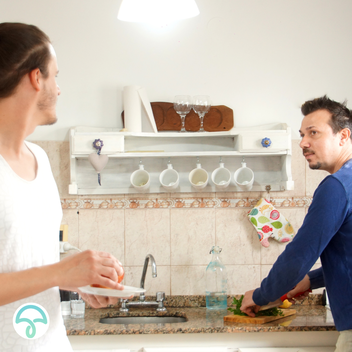Why is it so hard to leave a toxic relationship? It is often the case that after we get out of a relationship, we look back and we see all the things we couldn’t see when we were in the relationship: the pain, the rejection, the lack of respect and boundaries. But if it’s so painful, why isn’t it easier for us to see clearly what is best for us and leave a toxic relationship sooner rather than later? What is a toxic relationship?Not all toxic relationships are the same, but they share some common traits. Here we introduce 6 red flags and relationship patterns to look for and to avoid falling into a toxic relationship. By the way, this applies to all relationships. Not only romantic ones. We can have toxic relationships with our family, parents, friends, boss or any other important people in our lives. -Walking on eggshellsOne strong sign that you are in a toxic relationship is whether you feel you can be yourself or not. If you find yourself afraid to speak up, to share your feelings and your needs, or to express a different opinion, then probably there is not enough safety within this relationship. Walking on eggshells means that you feel the need to pre-consider what the consequences of your words, actions and decisions will be for the other person all the time, and you feel afraid that anything you will do or say will disrupt their peace, and ultimately they will be disappointed with you and leave you. -Lack of boundariesIf every time you express a different need or feeling, your partner protests, this means that they are trying to stop you from doing so by turning it into an unpleasant experience for you. Shaming or making you feel guilty is one way they do this. By not respecting your “no”, it means they don’t respect your boundaries, and in order for you to stop setting those, they will make you feel guilty and uncomfortable for voicing your needs or your “no’s”. “Look at what you have done now - with all your needs and demands!” is an example of them getting this message across. Related:-Lack of responsibilityBeing responsible for your mistakes and your decisions is one thing, but it’s another thing to be blamed for others’ decisions, feelings or mistakes. In a toxic relationship, the latter happens very often. You are told that you are responsible for every little thing that’s happening in the relationship to such a degree that you are confused about what’s right and what’s wrong in the end. And first and foremost, your partner barely takes responsibility for their decisions, as it’s easier to pass the blame onto you. -Too much control and entitlementIf you feel that your partner expresses themselves in a way that they always need to be right or to be the best or to know everything about your life, then there is a definite hierarchy in the relationship. The need to control is one of the needs human beings want to fulfil in order to feel safe. But in relationships, it can easily backfire. The same goes for entitlement: your partner feels that they need to be comforted more than you do, they barely apologise, and every fight ends with the story of them “having been treated unfairly by everyone in the whole world” and you need to make amends for that. -Lack of empathy It is often the case in a toxic relationship that your partner doesn’t understand when and how they hurt you. Actually, they aren’t even aware of their own feelings; they think that someone else caused them (“you made me angry”), and they don’t see that their feelings are related to their own thoughts or behaviour. Therefore, it’s highly possible that not only will you not be comforted when you are in distress, but on top of that, you will need to focus on their feelings and how much you upset them when you are in distress. -Lack of appreciationLast but not least, in a toxic relationship, you may barely hear a heartfelt “thank you”. Or an honest apology. You constantly feel unappreciated and if you dare to bring some of your efforts and positive contributions into discussion, they will be downplayed and reattributed to them. Related:Why is leaving a toxic relationship so hard?If all the above are happening in a toxic relationship, then why is it so difficult to stop the vicious cycle, to set boundaries, to protect ourselves or to leave such a relationship? There are many reasons, but let’s explore a few of them. -FamiliarityIt is quite common for those of us who have been raised in families with intense dynamics, absent (physically or emotionally) or overly critical and toxic parent(s), that we find it difficult to leave such a relationship because we simply find the environment familiar. Not nice, not pleasant, just familiar. People who experience this feel a sense of calm in the chaos. Redefining “calm” is what is necessary in order to leave such a chaotic relationship behind. -Desire to change the storyAgain, stemming from a toxic family, sometimes we are attracted to toxic partners because we hope that “this time it will be different”. This hope makes us try harder in order to fix it and give as many second chances as possible. We strongly believe that we can change our partner and the story will have a happy ending this time. -Damaged self-esteemAfter a long period of being in a relationship like this, there is no way that we can escape without being intoxicated with negative beliefs about ourselves. Having been belittled, disrespected, worn down, and rejected, has definitely left us exhausted and with little faith in ourselves. It is quite expected that we may think “I deserve this” and “It makes sense why no one would want to be with me”. We feel weak and helpless, and the thought of being out there all by ourselves is a very scary thought, way worse than being in a toxic relationship. Related:-GuiltAnother reason we stay in an unhealthy relationship is our own guilt. We believe we have played a big part in how things have turned out, we therefore feel responsible and remain in the relationship in order to fix our wrong-doing or our not-knowing. However, in a toxic relationship where only one person tries to fix things, it is unavoidable that our efforts will be linked (once again) to another mistake. There is an eternal battle of overcompensating and making amends, and that keeps us forever chained in a co-dependent relationship. Related:Can you fix a toxic relationship?Not all relationships with toxic elements are toxic. Not all unhealthy relationships are doomed to fail. However, knowing ourselves, and what is healthy and what is not, creates a basic foundation in order to set boundaries and recalibrate our relationship. In some cases, we need to redefine “love”, “joy”, “partnership”, “respect”, and other basic relationship terms, and for that, we may need the help of a friend or a therapist. Reach out. Get the love you deserve. You are not alone. What's next?Sometimes we cannot heal from our toxic relationships by ourselves. We might need the help and support of a friend or a mental health professional. If you’d like some advice or relationship therapy, you have come to the right place. Shoot us a message. You are not alone.
0 Comments
Your comment will be posted after it is approved.
Leave a Reply. |
Therapy |
|
